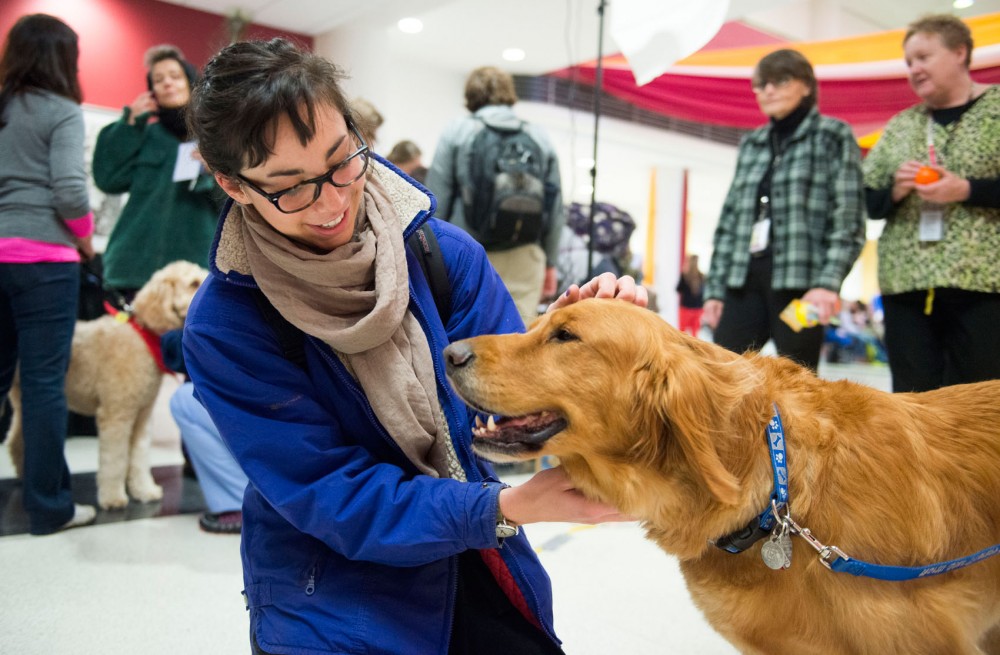Nick Ott went to the University of Minnesota’s “Cirque De-Stress” last week because he smelled the popcorn. The linguistics freshman left feeling a little closer to home after petting a golden retriever that reminded him of his own dog.
Starting next month, students can interact with registered therapy animals each week at Boynton Health Service on the East Bank. Though therapy pets are already a fixture during finals and midterms, the expansion is part of Boynton’s push for more mental health resources outside its oft-overbooked one-on-one counseling sessions.
Registered therapy dogs, Woodstock the Therapy Chicken and potentially cats and bunnies will offer students a chance to “Pet Away Worries and Stress” — the tentative name for the program is PAWS — beginning Nov. 13 and continuing almost every Wednesday through May.
The No. 1 health issue students experience is mental health, Boynton Chief Health Officer Ferd Schlapper said. When students struggle at the University, he said, it’s not usually because they’re incapable academically.
“It’s usually life that gets in the way,” he said.
But it can be hard for University students to get help when they need it. About 27 percent of University students have been diagnosed with a mental health condition, and in the spring, wait times at the East Bank mental health clinic stretched three or four weeks.
The Student Services Fees Committee granted Boynton partial funding to hire four additional mental health specialists this year. Boynton’s mental health expenses totaled $3.4 million in 2011-12, and they have since increased.
Schlapper said Boynton needs to get more creative to meet high demand. Otherwise it will be impossible to meet student needs with specialists seeing only one patient at a time.
Boynton has developed events like PAWS and Cirque De-Stress to broaden access to its services, said Boynton director of public health and communications Dave Golden.
“We think that awareness of resources and working on it earlier on … [can] help people deal with some of their mental health issues before they even need care from a therapist,” he said.
For last week’s Cirque De-Stress event, Boynton hoped to lure students to the circus for the entertainment value and give them tips on how to manage stress and anxiety once they got there, said Boynton Chief Medical Officer Dr. Gary Christenson.
The idea is to look at mental health from a public health approach, he said, rather than through face-to-face appointments.
“We’re very intrigued with how we can better provide resources to more students,” Christenson said.
Freshman Ashley Stevenson said she went to the circus because she felt stressed. She said she thought Boynton did a good job of making itself known to students.
Although Ott, the linguistics freshman, hadn’t heard of the circus beforehand, he said he enjoyed it. Ott added if he ever needed mental health services, he felt like he would know what to do.
PAWS and smell the roses
It’s not uncommon for students who first come to college to feel homesick and miss their pets, said Tanya Bailey, an animal-assisted interaction program specialist and PAWS coordinator.
“It’s the one aspect of their normal life that’s missing from campus life,” she said.
Registered therapy animals can help students manage this type of stress and others, she said.
The PAWS program is part of Nature-Based Therapeutics, a shared initiative between the University of Minnesota Landscape Arboretum and the Center for Spirituality and Healing, Bailey said.
Bailey said she was prepared for skepticism on Boynton’s spending when she presented at Parents Weekend this month, but PAWS received only positive feedback.
Animals and owners that are part of the program undergo rigorous training, Bailey said.
Wayne Halverson, a retired Facilities Management employee and registered therapy dog owner, said he enjoys seeing students light up when they interact with his golden retriever, Boudie. Halverson and Boudie attended Cirque De-Stress and plan to be at PAWS events as well.
“The reaction of the students … was just precious. It really was,” Halverson said.











